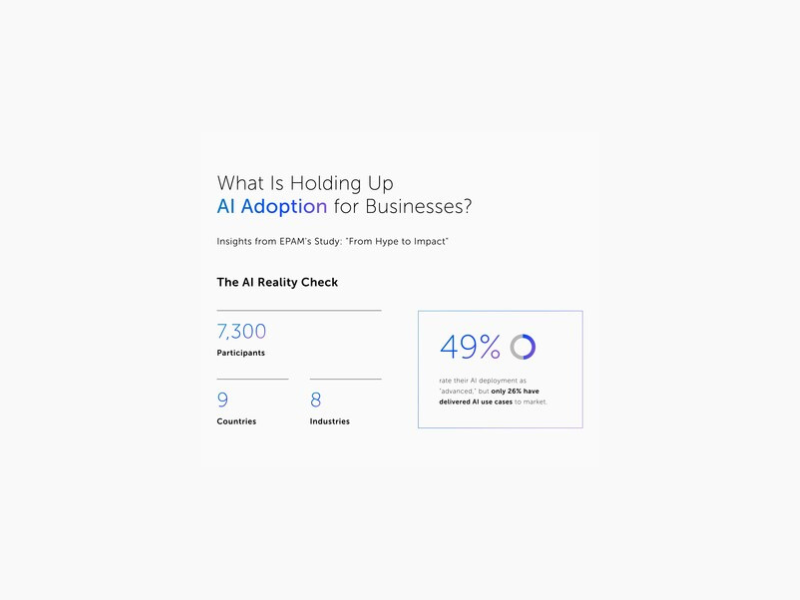EPAM Systems, Inc., a leading digital transformation and services and product engineering company, has officially published the results from its AI research report named “From Hype to Impact: How Enterprises Can Unlock Real Business Value with AI.”
Going by the available details, this particular report takes into account the opinion of 7,300 participants across nine countries and eight industries to effectively examine the current state of AI adoption, challenges and opportunities for businesses looking to generate tangible value from AI investments.
More on that would reveal how, by doing so, the study exposes a disconnect between perception and reality in enterprise AI adoption among respondents from across the U.S., Canada, U.K., Germany, Switzerland, France, Netherlands, Singapore, and Argentina.
You see, an estimated half (49%) of respondents rated their companies as “advanced” in AI implementation, with 5% identifying as “disruptors,” 32% as “competent” and 14% as “beginners.” Having said so, only 26% of those who self-identified as advanced companies and disruptors have successfully delivered AI use cases to market.
“Following the release of ChatGPT and throughout 2023 and 2024, we witnessed companies across industries experiment with AI and develop proofs of concept, primarily targeting immediate gains in productivity improvements and operational efficiencies,” said Elaina Shekhter, Chief Marketing and Strategy Officer at EPAM. “This new research clearly shows that we’re now entering a new phase where success depends on identifying high-value use cases and prioritizing them strategically to achieve broad organizational impact. Enterprises that can effectively align their talent, data and technology around these priority use cases will be the ones that actually deploy AI to scale.”
Talk about the achieved results on a slightly deeper, we begin from the point of accelerating AI investments. This translates to how companies plan to increase their AI spending by 14% year-over-year in 2025, signaling a continued commitment to AI-driven growth.
Despite the investment, though, scaling AI remains a big challenge. While 30% of technology-advanced companies have successfully implemented AI at scale, many organizations struggle to bridge the gap between experimentation and enterprise-wide deployment.
Another detail worth a mention is rooted in AI’s direct impact on business, something which can be better understood once you take into account how disruptors presently attribute 53% of their expected 2025 profits to AI investments, demonstrating a tangible financial impact for the market leaders.
Hold on, we still have a few bits left to unpack, considering we haven’t yet touched upon the way governance and security were found to actively trail AI growth. In essence, businesses across the board reported to anticipate a minimum of 18 months in regards to implementing effective AI governance models, thus highlighting the complexity of aligning AI with the rapidly evolving regulatory landscape.
Rounding up highlights would be a piece of detail, which claims that AI talent remains a priority, as 43% of all companies surveyed plan to hire AI-related roles throughout 2025, with machine learning engineers and AI researchers being the most in-demand positions.
“Improved productivity and operational efficiency are universal goals, but true transformation lies in bridging the gap between tech teams and the business,” said Dmitry Tovpeko, VP of Engineering at EPAM. “As AI reshapes the enterprise, developers are evolving from task-oriented users to strategic experts, responsibly harnessing AI for end-to-end scenarios. Success hinges not on tech stacks or cloud infrastructure, but on aligning tech teams with business objectives to solve real-world customer problems.”
EPAM’s report also took this opportunity to showcase measures that companies can take to leverage the full potential of AI. These measures, for instance, include establishing strong leadership. This is made evident by 65% of disruptors boasting the necessary skills for AI adoption.
The modernization of technological setup is another key initiative. It happens to be the case because 31% of executives see outdated technology as a barrier to AI adoption,
Developing the framework for responsible AI and governance also emerged as a vital step after it was discovered that no more than 4% of disruptors said they have developed comprehensive governance frameworks even with the understanding that effective governance is typically 18 months away.













